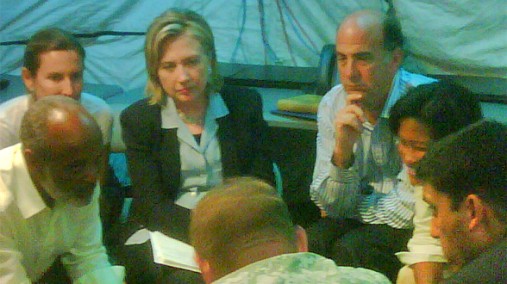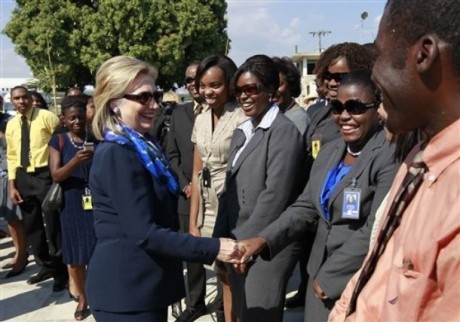No, I had never been in the National Palace, but like the Getty station I had been next to when I heard the news, it was a building I passed four times daily on my way to and from work at the Haitian-American Institute where I taught English. That link goes to a whole new building. The building where I taught was an old mansion on the east end of the Champs-de-Mars on Rue Capois. Like the National Palace, it had collapsed - probably while evening classes were going on at the busiest time of day there.

On July 4,1942, Haitians and Americans founded a bi-national center to reinforce friendship and cultural ties between their two countries. Located in the heart of Port-au-Prince, the Haitian-American Institute has enjoyed decades of continuous community service and remains faithful to the ideal of its founders.It is a bi-national center run partially by the State Department. It's great to see this grand new facility!
The Haitian-American Institute itself stands on a landmark site. The original building was the house that once belonged to former Haitian President Elie LESCOT. This building, pictured in the pen and ink drawing at the top of this page, was destroyed in the January 12, 2010 earthquake.
In the old building, I loved teaching at six in the morning in the classroom on that very top floor. You could see the city waking up. I would walk up the many flights of stairs early just to go out on that balcony and watch for a few minutes before the students arrived. When Dr. Ainslie Minor was director, as was his position as Cultural Affairs officer at the embassy, he was often on the front steps to greet me and the arriving students prior to the early morning classes. We all loved him! He loved the institute and everything about it. We teachers were disdained by some subsequent directors until Millie McCoo arrived. She, too, loved the institute, the students, and the teachers.
Passing the palace, on my way to work, I was usually on foot. I nodded to the guards in the guardhouse every day - several times a day. I later learned that the police headquarters adjacent to the palace had also crumbled to the ground. I was in there regularly on my annual trek through the ministries to renew my visas.
All of those ministries were gone. So were the people in all of them. All the people in all of those buildings. My HAI and all of the government buildings.
It was beyond my imagination, much the way the collapse of the twin towers had been on 9/11. I heard the news only one traffic light away from where, that September morning, I had heard that a plane had flown into One World Trade.
How could it be? Who could have survived this? How on earth could my poor, dear Haïti Chérie recover?
As I had over those "green weekends" in June 2009 when the Iranians were protesting their elections, I took to Twitter. A girl had texted, trapped in rubble beneath a supermarket that I knew. One where I had shopped. Many of us continually retweeted her location (and many others). 24 hours later, on the news, I saw her pulled out alive and well and wept. The reporter said they had found her from the tweets.
That tarmac, where I had boarded and disembarked so many, many times was the tarmac where Hillary landed only five days after the worst disaster in memory in that country - the very first high foreign official to set foot on Haiti's shaken soil after the quake. This was no photo op or campaign junket. Hillary's visit was from her heart. It was dangerous, responsive, and crucial.
That, and much more was in my heart as I started reading this chapter and Hillary's words about landing at the airport that, when I lived there, was named for François Duvalier and had undergone a major upgrade just before I left the country for good.
****************************************************************************************
Hillary was in Hawaii on her way to Asia when the quake - that came to be known as "Haitiquake" - occurred.
Hillary Clinton: “… it is Biblical…”
Hillary had to change her plans. She flew back to D.C. immediately.
Hillary Headed Home to Manage Help For Haiti
She was at the White House the next morning and the pain was in her face ... the terrible pain.
I followed her progress to Haiti partially thanks to Greta Van Susteren who tweeted generously from the plane where she sat beside Andrea Mitchell and less so thanks to the old State Department Twitter that went by the handle "Dipnote," which, in retrospect, was not so bad and pretty democratic.
When Hillary landed I thought of her as really and truly "superwoman." I am sure the Americans at the airport waiting to be evacuated thought of her that way too - or as an angel of mercy.
She was landing on menacingly shaky ground. People who demand further service from her ought to consider the risks she has already taken, the sacrifices she has already endured, the time in the air and on sometimes dangerous foreign soil, away from her family. When does this "superwoman" get a chance to step back and let someone else take the reins?
Hillary Clinton, Angel of Mercy: Her Press Conference & Details on her trip to stricken Haiti
Video: Hillary Clinton’s Press Briefing about her trip to Haiti
Hillary Clinton is Wheels down in Haiti (MSNBC)
Video: Hillary Clinton Arriving in Haiti
Hillary to the rescue!
Video: Hillary Clinton Speaks to The Haitian People
Hillary Clinton in Haiti: Some Images From Today
Hillary was accompanied by Cheryl Mills and USAID Director Rajiv Shah (2nd and 1st on the right respectively above). Cheryl, from what Hillary says, must have been the one who got the "people-finder" set up as well as the text system for sending donations easily from your cell phone.
Rajiv was on the ground at the Champs-de-Mars in front of the collapsed National Palace where it seemed much of the Port-au-Prince population was camping out. I remember him finding some enterprising young folks who had managed to have two car batteries and one car. They had set up an enterprise allowing people, for a fee, to charge cell phones off one car battery while another of the crew ran a taxi service to charge the other battery. It was so Haitian!
Secretary Clinton Announces Launch of State.Gov Person Finder Tool for Those Missing in Haiti
Secretary Clinton’s Daily Appointments Schedule for January 15, 2010
After the earthquake, President Préval told Cheryl Mills that he really needed Hillary and needed her now! He was Hillary's friend. He needed help. I perceived him as a nice guy, but not as a strong leader.
Hillary Clinton is NOT the President of Haiti!
When you run for the office, before you even win, you need to consider this kind of situation and how you will react - even if you did just miss having your house fall on top of you. That is the role you assume as leader of a country.
Try to imagine the White House or the Capitol this way. This is what happened to Haiti.
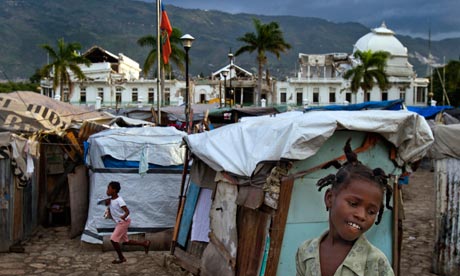




When Hillary arrived, injured Americans were being cared for by a devoted embassy nurse who worked non-stop. Our Cultural Affairs officer, Victoria DeLong, had been killed when her house collapsed on her. I had been in that house several times on very happy occasions. Dr. Ainslie Minor and his lovely wife, and later Millie McCoo had generously invited the teachers to barbeques and parties. I had danced the merengue under that roof and met Millie's sister and brother-in-law, Marilyn McCoo and Billy Davis Jr., there. Now that roof had killed a Foreign Service officer.
There was a massive and effective U.S. response. Hillary remarks that U.S. military felt so refreshed at being welcomed somewhere.
One year we had no electricity from the last night of Carnaval in early February until about mid-June. The lights went out when Carnaval ended at midnight. From then on sectors got one hour of electricity a day on a rotating weekly basis. If you needed to do anything that required power, you needed to be home at your hour for that week. If you were working at that time ... too bad. From Boutillier, the mountaintop above the city, you could see a sector darken and another light up on a clockwork schedule.
Then the United States Marines arrived with generators and I don't know what all else. I would be leaving my early morning classes at the institute (we taught from 6 -9 a.m. and from 3 - 6 p.m. or 4 - 7 p.m.) and they would be on the steps of the Hotel Plaza waiting to be picked up. We cheered them every time we passed them. "Thank you!" Our electricity was returning. Nice that after the earthquake the troops got the same reception. We have a sort of edgy relationship with Haiti as far as troops go. Americans built the best roads there - during the occupation.
In this case, the distrust engendered by the history of the occupation could have been Préval's political enemy. Yet to unblock the shipments of aid at the airport and seaports, someone needed to be in charge - not to take over the country - just to lubricate the flow of aid. Hillary got Préval to sign an agreement that U.S. military would, temporarily in the emergency, administer the airport and seaports.
Hillary Clinton is Wheels Up!
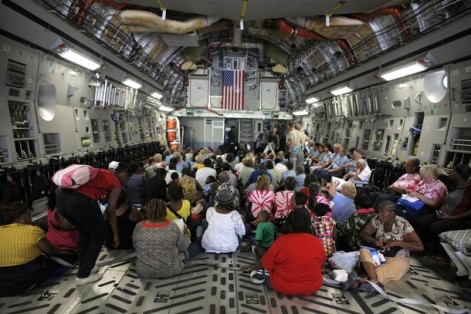
The plan was to establish camps. Préval worried that putting displaced people in camps would make camps permanent. The U.N. contended that camps provided the best efficiency for necessary distribution of aid.
To my mind, and this is just me, the camps were newer, safer, cleaner than the neightborhoods some people had come from, like Cité Soliel, but many were not from those slums, so there was something to be said on each side of the argument.
For Haiti, the approach would involve both short-term aid and long-term plans for development that had already been in the incubator.
Bill Clinton Arrives on Mission to Haiti (CBS/AP)
On-the-Record Briefing on Consular Services Being Provided to American Citizens in Haiti and in the United States in the Aftermath of the Earthquake
U.S. Government Response to the Haiti Earthquake
Secretary Clinton’s Update on Haiti
The outpouring of support and assistance from around the world has been extraordinary, and I’ve been very proud to see generous Americans from every corner of our country open their hearts in solidarity with the Haitian people. These are the times when we remember our common humanity, when we pull together across cultures and borders to help those suffering and in need.
Secretary Clinton at the Ministerial Preparatory Conference on Haiti 01.25.2010


Today, Secretary Clinton announced that she will run an International Haiti Donors Conference in March at the U.N. You may remember her words at the Haiti Donors Conference last April in D.C. That speech was simply spot-on.
Secretary Clinton’s Remarks to Haiti Earthquake Volunteers
From U.S. Department of State: Some Details on the Upcoming International Donors’ Conference Towards a New Future for Haiti
Secretary Clinton’s Remarks at the International Donors’ Conference Towards a New Future for Haiti
We have had over 140 nations working to support the Government of Haiti in delivering food, temporary shelter, and medical care to thousands of survivors. But the emergency relief is only the beginning of what will be a long road to recovery, as the Secretary General just pointed out; one that will require global support.
Some people wonder, “Why Haiti? Why this great outpouring of international humanitarian concern and commitment to Haiti’s future? Why is Haiti’s fate of such consequence to the region and the world that it deserves sustained help? Why should we hope that this time, with our collective assistance, Haiti can achieve a better future?” These are questions that deserve answers and I believe that this conference will begin to do so...
Before the earthquake, Haiti was on a path to progress. The government, led by President Preval, had started enacting critical reforms. Haiti’s economy grew by nearly 3 percent last year. Two international chains launched new hotels, a sign of a rising tourism industry. New factories were opening and others had been contracted to begin production. But with the earthquake, the results of much of this hard work were wiped away. But the people of Haiti never gave up. As they mourn their losses, they gathered the resources they had left and began working around the clock to put their lives and their country back together. They relied on the strength and the spirit that have carried them through tough times before. But they need our help. They cannot succeed without the support of the global community, and we need Haiti to succeed. What happens there has repercussions far beyond its borders.
Hillary sees development as a key component in national security and USAID as an essential agency which played a huge role in addressing long-term plans to assist Haiti. She recounts the war against USAID waged by Jesse Helms and celebrates this initiative which she and Rajiv Shah initiated in 2011 and she proudly saw launched earlier this year.
Hillary Clinton at U.S. Global Development Lab Inauguration
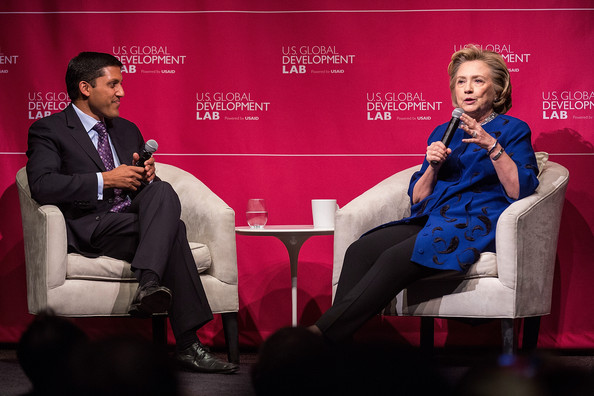
A year after the earthquake, Hillary returned to see the progress of the response (including to the subsequent cholera epidemic) and met with the presidential candidates. There remained many challenges but things looked greatly improved.
Hillary Clinton in Haiti
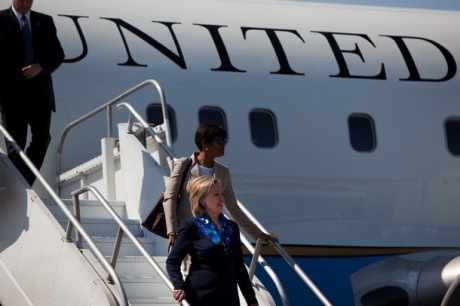

"Shifting our focus from aid to development ... The United States was not abandoning traditional aid ... especially as part of an emergency response ... we sought to break the cycle of dependence that aid can create .... Aid chases need; investment chases opportunity." (Hard Choices)
Hillary Clinton’s Remarks at the Caracol Industrial Park Opening Ceremony in Haiti (with Bill Clinton!)


She recounts a personal moment with Préval after the disputed elections and credits him for being the exemplar - the first in Haitian history - to turn over the reins of leadership peacefully to a successor not of his backing but chosen by the people. When she speaks of the toughness of democracy, the danger of the running and the peril of the vote, my memory rewinds to the Aristede election when Haitians literally risked their lives at the polling places and some were, in fact attacked and killed just for trying to vote. This time, indeed, there was progress, and despite everything Préval might not have been, he, maybe, is their John Adams in some ways.
These images of the former and current presidents, Préval and Martelly, celebrating at the Caracol opening together were historic.
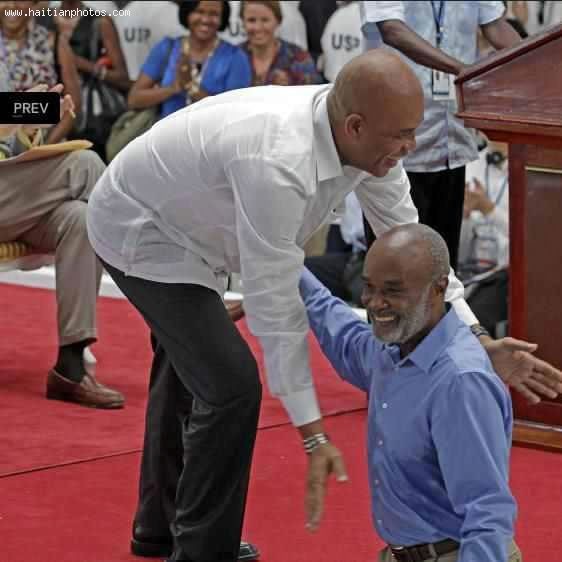
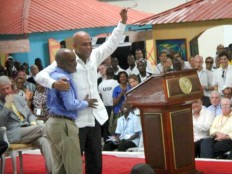
In the book, Hillary provides a thorough and fair accounting of what has worked and what has not in the aftermath of this disaster. Shortly after she returned to the department following her health crisis in late 2012, this report was issued.
Haiti Three Years After: What Hillary Clinton’s State Department Has Done
__________________________________________________________
Hillary Clinton’s ‘Hard Choices’ Retrospective: Introduction
Access other chapters of this retrospective here >>>>
__________________________________________________________####





